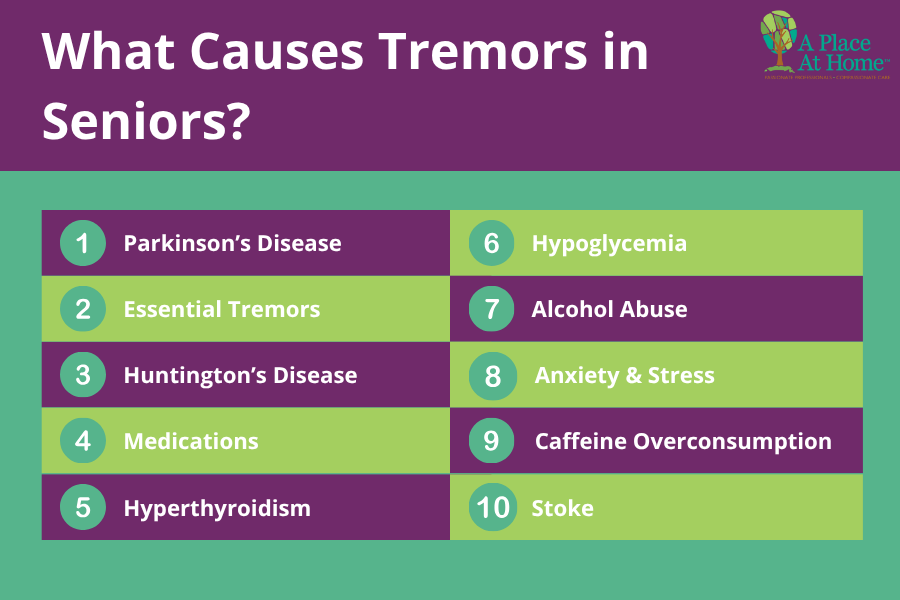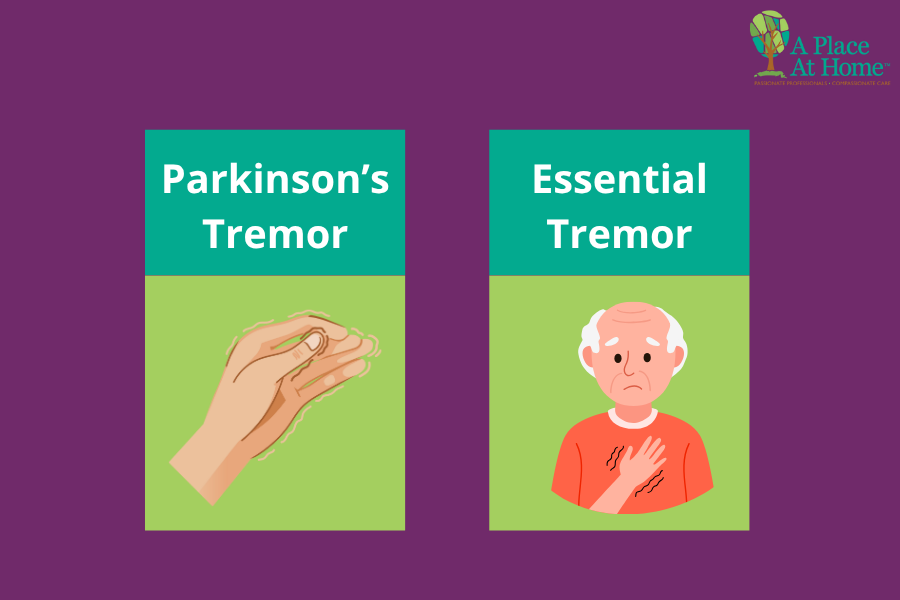Many older adults experience tremors as they age, and in fact, the National Institute of Neurological Disorders and Stroke (NINDS), reports that nearly 10 million people in the U.S. are affected by essential tremor, with prevalence increasing significantly after age 65. These involuntary shaking movements can affect the hands, head, voice, or other parts of the body and may stem from a variety of causes. In many cases, tremors in seniors are linked to neurological conditions, medication side effects, or age-related changes in the nervous system.
By understanding what causes tremors in seniors, caregivers can take the right steps to support their loved ones, manage symptoms effectively, and maintain their comfort and independence.
What Are Tremors and How Do They Affect Seniors?
A tremor is an involuntary rhythmic shaking of one or more body parts. Research shows that nearly 60% of seniors with chronic tremors report difficulty with daily activities such as writing, dressing, or eating independently (Parkinson’s Foundation). While the hands are most commonly affected, tremors may also impact the head, legs, or voice. Though not usually life-threatening, persistent shaking can make everyday tasks like eating, driving, or writing challenging.
Tremors occur when there is abnormal activity in the parts of the brain that control movement, such as the cerebellum or basal ganglia. These brain regions help coordinate muscle control and stability, so when they are disrupted by age-related changes, neurological conditions, or medications, involuntary shaking can result.
Two primary types of tremors affect older adults:
- Action tremors: These occur during movement, such as when a senior reaches for an object or writes with a pen.
- Resting tremors: These appear when the body is at rest and may signal an underlying neurological disorder, such as Parkinson’s disease.
Common Causes of Tremors in the Elderly
Understanding what triggers tremors in seniors is essential for identifying the root cause and determining whether the shaking is temporary, medication-related, or a sign of a more serious condition. Tremors in older adults can result from neurological disorders, metabolic imbalances, lifestyle factors, or even emotional stress.
For caregivers and family members, recognizing the pattern, frequency, and severity of a loved one’s tremors can provide valuable clues. For example, tremors that occur while moving may point to an essential tremor, while those that happen at rest could indicate Parkinson’s disease or another neurodegenerative disorder. Below are some of the most frequent causes of tremors in the elderly, ranging from common medical conditions to lifestyle and emotional factors.

1. Parkinson’s Disease
One of the most recognized causes of tremors in seniors is Parkinson’s disease, a progressive neurological condition that affects movement. Tremors caused by Parkinson’s typically appear when the hands are at rest and may lessen during activity. This condition occurs when nerve cells in the brain deteriorate, leading to reduced muscle control.
2. Essential Tremor
Essential tremor is another common movement disorder among seniors, often mistaken for Parkinson’s. Unlike Parkinson’s tremors, essential tremors occur during movement, for example, while eating or drinking, and frequently run in families.
3. Huntington’s Disease
Huntington’s disease is an inherited condition that damages brain function and reduces cognitive and motor control. It can cause involuntary jerking or tremors in the hands, arms, face, and upper body.
4. Medications
Certain prescription medications can lead to tremors as a side effect. Drugs used to treat high blood pressure, asthma, depression, or seizures can sometimes cause hand tremors in older adults. Always consult a physician before stopping or adjusting medications.
5. Overactive Thyroid (Hyperthyroidism)
An overactive thyroid increases the body’s metabolism, which can overstimulate nerves and muscles. Seniors with hyperthyroidism may experience tremors, weight loss, heat sensitivity, and rapid heartbeat.
6. Low Blood Sugar (Hypoglycemia)
Hypoglycemia occurs when blood sugar falls to below normal levels. Seniors may experience this condition when they exercise excessively or develop diabetes. Symptoms of low blood sugar range from confusion to hunger and tremors. Muscles that lack their energy source, sugar, begin to shake.
7. Alcohol Abuse or Withdrawal
Older adults who drink excessively are vulnerable to tremors. Hand tremors can start within hours of alcohol consumption and last for weeks. Similarly, the sudden cessation of alcohol intake, which can lead to withdrawal, can also be responsible for tremors. An alcoholic’s tremors usually resolve upon detox.
8. Anxiety and Stress
Seniors who suffer from anxiety may suffer from tremors. During bouts of anxiety, stress hormones are released. The adrenaline and cortisol increase their heart rate and blood pressure, preparing them for fight or flight. The surge of energy manifests as involuntary shaking.
9. Caffeine Overconsumption
Too much caffeine can overstimulate the nervous system and lead to jitteriness or hand tremors in seniors. Reducing coffee, tea, or soda intake can help manage symptoms.
10. Stroke
A stroke damages the brain, including regions that control movement, such as the cerebellum or basal ganglia. When motor pathways are disrupted by a stroke event, involuntary muscle contractions and tremors result. Tremors caused by a stroke can appear soon afterward or be delayed.
Are Tremors in Seniors Always a Sign of Parkinson’s?

Not necessarily. Many seniors mistakenly associate all tremors with Parkinson’s disease, but essential tremor and other benign causes are also common.
- Essential tremor: Happens during movement and often runs in families.
- Parkinson’s tremor: Occurs at rest and is usually accompanied by stiffness and slower motion.
A neurologist can perform diagnostic tests to determine the cause and recommend appropriate treatment.
How to Manage Tremors in Seniors
Depending on the type of tremors, lifestyle modifications, medicines, surgery, and tremor therapies can be utilized to effectively manage a senior’s symptoms. It’s crucial that the older adult work with their healthcare provider to develop a treatment or combination of treatments to find the best option.
- Lifestyle changes: Lifestyle changes include eliminating or cutting down on caffeine and alcohol, both of which reduce the severity of tremors. When feeling anxious or stressed, seniors should try relaxation techniques, such as deep breathing and meditation. Avoid stressful situations when possible.
- Medications: Beta blockers, anticonvulsants, and tranquilizers are medications that reduce the frequency of tremors. However, medications may produce unwanted side effects, so it’s critical to discuss the pros and cons with the doctor. Surgery, like Deep Brain Stimulation (DBS), is an option for debilitating tremors.
- Therapies: New non-invasive therapies, such as wearable nerve stimulation devices, can help control tremors. These wrist-worn devices deliver mild electrical pulses that calm overactive nerves and muscles. Additionally, home care from professional caregivers can assist with the management of symptoms.
Compassionate In-Home Care for Seniors Living with Tremors

Tremors can make simple daily tasks, like eating, dressing, or driving, feel overwhelming. At A Place At Home, our compassionate caregivers help seniors manage these challenges safely and comfortably with our personalized senior home care services.
We provide:
- Meal preparation and feeding assistance for those with limited hand control
- Safe transportation for appointments and errands
- Personal hygiene support to help seniors maintain dignity and independence
Our customized care plans include options for respite care, overnight care, 24-hour care, and post-surgery support; all delivered in the comfort of home. If your loved one in Orange County, FL is struggling with tremors or mobility issues, contact A Place At Home – Winter Garden today at (321) 285-1095 to schedule a free in-home consultation and discover how compassionate care can improve their daily life.
FAQs – Tremors in Seniors & Older Adults
When should a senior see a doctor for tremors?
If tremors appear suddenly, worsen over time, or interfere with daily activities, schedule a medical evaluation to rule out neurological or metabolic causes.
Can stress or anxiety cause hand tremors in seniors?
Yes. Stress and anxiety release hormones that temporarily increase shaking or jitteriness, especially in seniors sensitive to adrenaline.
Can tremors in the elderly be treated?
While not all tremors are curable, most can be managed with medication, therapy, or lifestyle changes to improve stability and comfort.

